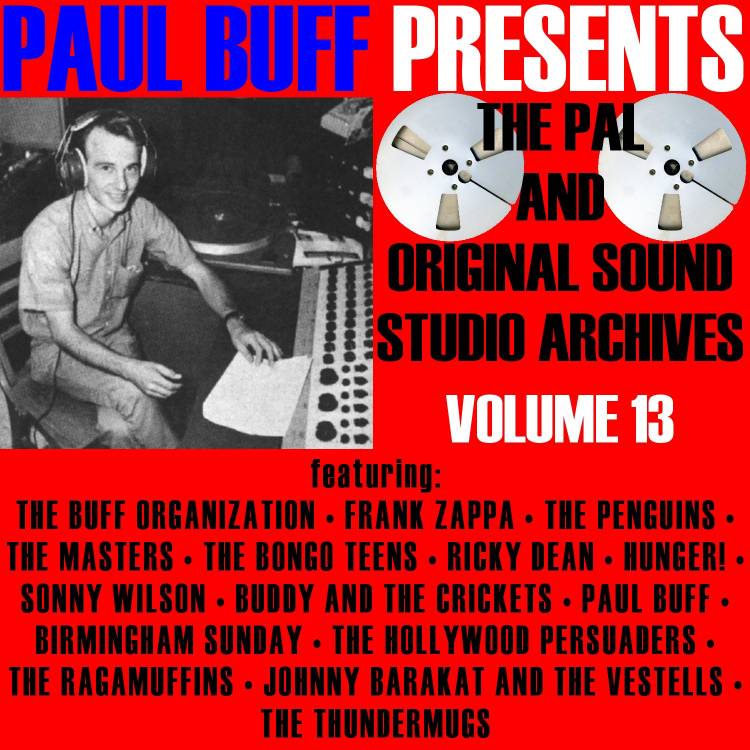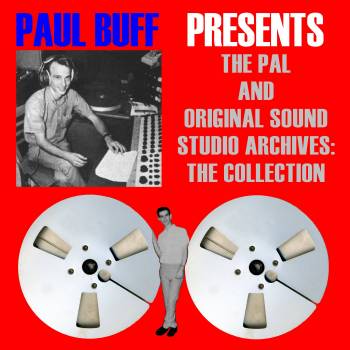

|
|
| (2010, download, - , crossfire publications) |
 |
| (2011, flash-drive, usa, crossfire publications) |
paul buff presents the pal and
original sound studio archives, vol.13
-
feat.contributions by frank zappa
| 2010 | download | - | crossfire publications |
re-releases
(2011, flash-drive, usa,
crossfire publications) =
the complete 35 album series, with bonus liner notes on pdf and 56 extra tracks
various tracks recorded by
http://cdbaby.com/cd/paulbuffpresents10
the buff
organization: fuzz instrumental
frank zappa:
love of my life (piano intro)
the penguins: memories of el monte (stereo mix)
the masters: t bone (stereo undubbed backing track)
the bongo teens: baja rhythm
the buff
organization: chains
ricky dean: little betty limbo (single mix)
sonny wilson: troubled times (demo)
the masters: sunday blues (outtake 2)
buddy and the
crickets: it's gonna work out fine
buddy and the
crickets: jezebel
paul buff: you will never have to dream (version 1)
the buff
organization: these boots are made for walkin'
the hollywood
persuaders: rush street
paul buff: piano/bass/drums
johnny barakat and the
vestells: sophisticated surfer
the buff
organization: groovy summer afternoon
the ragamuffins: two much
the thundermugs: captain midnight
hunger!: portland 69 (revised lp version)
birmingham
sunday: prevalent visionaries
the thundermugs: muffin man
liner notes by Greg Russo
Welcome to Volume 13 of Paul Buff's 20-volume series of
recordings from Pal Studios and Original Sound Studios! Pal Records was a record
company run by his mother Olivia and stepfather Ward Allen. After Paul Buff was
honorably discharged from the military, he finished putting together Pal Studios
in December 1957. The studio costs were $12.50/hour for mono recording and
$15/hour for stereo. Local musicians booked the studio to make recordings of
their rehearsals and repertoire. When Pal Records wound itself down in mid-1959,
Paul Buff created his first record label - Emmy. Other labels (Plaza, Yukon and
Vigah!) would follow shortly thereafter. The music presented on this series was
released on extremely rare records that would literally cost thousands if you
can find them. In addition, there are many unreleased tracks spanning from 1960
to 1969. Paul Buff is now making them available again for everyone to
appreciate.
The Buff Organization has invaded this volume, and
that's a good thing! We begin with a bang - Paul Buff's "Fuzz
Instrumental." A powerhouse of a track, too bad it was not heard by the
public until now. Frank Zappa's brief tinkering on the piano for "Love Of
My Life" goes right into a stereo mix of The Penguins' "Memories Of El
Monte," which of course Frank wrote with Ray Collins. Many people have not
heard it in stereo, but here it is! Another stereo track is "T Bone"
by The Masters. This is the same take as the one used for the single, but this
is the stage before Ronnie Williams added the bass to a mono mix of this track.
The Bongo Teens' "Baja Rhythm" was another
tune that was only released in Mexico. Paul Buff and Dave Aerni covered
different ground on this one. Compared to most of their other tracks,
"Chains" by The Buff Organization also went into a different
direction. Sung by Allison Buff, "Chains" covered the restrictions of
'60s society.
In the more innocent part of the '60s - the pre-Beatles
period - songs like Ricky Dean's "Little Betty Limbo" reigned supreme.
We've heard an alternate version before, but here is the original single version
that was written by Paul Buff. He never received a cent for it, but that will
change!
A lot of time was spent on getting Sonny Wilson's
"Troubled Times" just right. Before they got there, though, they
recorded a demo version at a different pace. The same applied to The Masters'
"Sunday Blues," which appears in its second outtake version.
On Volume 10, we heard the song "Jezebel" by
Johnny Barakat And The Vestells. That was recorded in early 1963 with Frank
Zappa producing and providing backing vocals. This volume has something even
rarer - both sides of a late 1962 Pal acetate from the unknown group Buddy And
The Crickets (of course, not related to the late Buddy Holly's group!). Frank
Zappa, in his first production role, was involved with both tracks. The group
was a little rough around the edges, but the unmistakable FZ production greatly
raised their quality. The instrumentals recorded were a cover of the Ike And
Tina Turner hit "It's Gonna Work Out Fine" (released in July 1961) and
Wayne Shanklin's "Jezebel" (popularized by Frankie Laine). Many thanks
to Don Weddle, who found the acetate in a thrift shop in Alta Loma, California!
Paul Buff also gave two tries to his song "You
Will Never Have To Dream." This is a very rough first attempt before he
went all out for the second one. No retakes were necessary for The Buff
Organization's cover of the Nancy Sinatra smash "These Boots Are Made For
Walkin'." You can hear Allison Buff during the stops, but it's not clear if
Allison planned to do a vocal at some point. This is the way that it survives,
so that's the way we're going to enjoy it!
Barrett Strong's "Money (That's What I Want)"
was the clear inspiration for The Hollywood Persuaders' "Rush Street,"
but Buff made sure to take it where it never went before. You can never go wrong
with those old familiar chord changes, so Paul would occasionally record those
bits as things like "Piano/Bass/Drums."
Johnny Barakat & The Vestells were very busy at Pal
Studios during 1963, as their "Sophisticated Surfer" and
"Smack" indicate. Their sound was almost as rough as The Velveteens at
times, but both groups shared the same enthusiasm in playing their material.
Barakat's reference to "Candid Camera" will probably pass by many
younger people today, but the older folks will remember how popular that TV show
was!
The Buff Organization's "Groovy Summer
Afternoon" has 1967 all over it. The song was done by Paul Buff under
numerous titles, but the arrangement remained the same. Check out all the Buff
Organization releases to hear all of them!
Volume 12 included The Ragamuffins' "Talk Me
Down," one of four tracks done at Original Sound prior to their expansion
to The Music Machine. This volume contains another aggressive Sean Bonniwell
tune from that Ragamuffins session: "Two Much." Although influenced by
the British pop groups that dominated the American scene at the time, "Two
Much" also had some of Bonniwell's attitude going on as well. When The
Music Machine came up with their public image (dyed black hair, wearing one
black glove, etc.), there was a lot of attitude going on!
The Thundermugs recorded for All-American and were led
by main songwriter and vocalist John Robert "Jack" Lutz. "Captain
Midnight" was a single A-side dealing with our beloved policemen! Two
tracks after this is The Thundermugs' "Muffin Man." No, it's not the
World Of Oz or later Frank Zappa song - it's Jack Lutz's own creation.
"Muffin Man" is another of Jack's excellent storytelling songs. It was
not released at the time, but it later turned up in Italy. This Thundermugs
group was not related to the later Canadian band Thundermug.
In-between the Thundermugs tracks is a track by Hunger!
That was not a joke - the band spelled their name with an exclamation point!
Hunger! was a group from Portland, Oregon that moved to L.A. in an attempt to
make it. Their only album "From Hunger!" was originally released on
their own Public label based in Hollywood. When they met up with All-American
label honcho Bill Holmes, the band agreed to beef up some of the organ-based
tracks laid down at Original Sound with help from Strawberry Alarm Clock
guitarist Ed King. The plan was to release the new edition of the LP on
All-American, but the disc never got past the test pressing phase. The later
version of "Portland 69" is featured on this volume. It takes a while
to unravel, but it is well worth it. Fans agree that it is one of the best
tracks on both editions of the album.
The A-side of Birmingham Sunday's All-American single,
"Prevalent Visionaries," is on this volume. Lyrically and musically,
the group was much more advanced than most of its competition. From a commercial
standpoint, neither this A-side or its flip ("Egocentric Solitude" on
Volume 12) had no chance. That didn't matter. Birmingham Sunday offered highly
intelligent psych-based pop that still stands up - that matters!